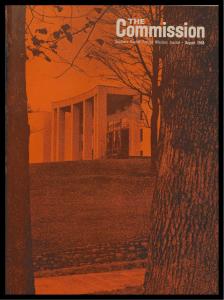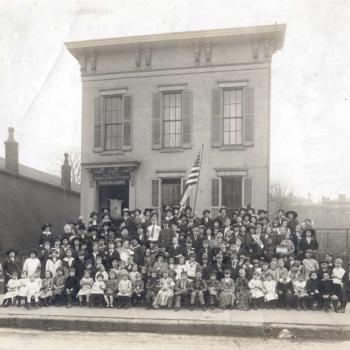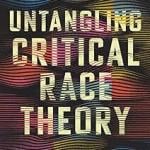If you pay any attention to Southern Baptist media surrounding the SBC’s annual conventions, you won’t have to wait too long to hear calls from denominational leaders to “keep the main thing the main thing,” that is, keep the focus on Southern Baptist mission work and evangelism. In what has almost become a liturgical tradition, Southern Baptist presidents, seminary presidents, entity heads, and influencers will call for unity amid all the controversy and political tension that threatens Southern Baptist cooperation. Sharing the gospel, entity heads will say, is the heart of the SBC. Even if the heart pumps to the beat of the gospel story, the SBC’s nervous system has been conditioned by other influences, being antagonized repeatedly by sore spots in the national body, especially in areas of racial inequity, social justice, and sexual abuse. When these sores are poked before the public and observed over an extended period of time, it traditionally has not taken long for groans of “distraction” to seep out of the pews and from behind the office doors of denominational leaders. Without a doubt, claiming such essential issues of justice as “distractions” from the preaching the gospel rings as problematic in an age well acquainted with social justice rhetoric and calls for reform. But I’ve found that Southern Baptists come by this attitude honestly.
For nearly 200 years, the Southern Baptist Convention has made its way and preserved its identity by prioritizing sending missionaries and empowering churches for evangelism. In fact, that was the reason for its founding—to preserve the centrality of the gospel in the face of political unrest.
Well, in all honesty, it was founded to sidestep the moral question of whether or not disciples of Jesus Christ could share the gospel of freedom while owning other human beings as property.
But the question was ostensibly bracketed off precisely for the purpose of keeping a focus on home and foreign missions—Southern state associations wanted the ability to appoint slaveholders as domestic and international missionaries. So, in 1845, just over 350,000 Southern Baptists broke away from the Triennial Convention and formed the SBC.
The architects of the Southern Baptist Convention argued their separation from the Triennial Convention was an attempt to focus on the kingdom of God instead of politics. As leading voice of the new convention’s creation, William Johnson, wrote in a statement on the SBC’s creation, the reason for the new body was “the extension of the Messiah’s kingdom, and the glory of our God. Not disunion with any of his people; not the upholding of any form of human policy, or civil rights; but God’s glory, and Messiah’s increasing reign[.]” Johnson’s statement argued the separation of Southern Baptists into a new group was a necessary evil, since Northern Baptists had created a human edict “forbidding us to speak unto the Gentiles” (1 Thess. 2:16) because of many Southerners’ position on slavery. Northern Baptists had turned a temporal disagreement into a gospel issue, and so the Southern Baptists had to do what was right—they had to separate so they could focus on building the kingdom. The SBC claimed to coalesce as a way to uphold the Triennial Convention’s formerly stated agnosticism on the question of slavery. In reality, the SBC’s comfort with the status quo had the immediate effect of upholding chattel slavery’s acceptance among God’s people. The non-answer of the SBC on the question of slavery was de facto a resounding “Yes.”
Paul Harvey’s Redeeming the South: Religious Culture and Racial Identities Among Southern Baptists, 1865-1925 notes that in the decades after the Civil War, Southern Baptists became quite concerned with political issues, especially as it related to Black empowerment and Northern usurpation. Only for these ministers, it wasn’t merely political. Harvey writes that “White southern ministers were quick to complain of political preachers, but churches that served as organizing centers for resistance to Reconstruction rarely found themselves labeled as mere dabblers in politics. White southern Christians did not even recognize such activity as political in nature but as an extension of the cosmic struggle between order and disorder, civilization and barbarism, white and black” (Harvey, 24). Political organizing around prohibition, Black disenfranchisement, and the economic shifts of the late nineteenth century consumed Southern Baptist publishing efforts. All the while, Black Baptists exited the denomination in droves. By the turn of the twentieth century, the SBC was an utterly white denomination, and Black Baptists had formed a new convention, the National Baptist Convention.
In the wake of WWI, Southern Baptist attitudes shifted, especially among conservatives, as the threats of evolution, atheism, and biblical higher criticism captured fundamentalists’ imaginations. For fundamentalists, the hubris and failures of liberal or modernist Christianity were evident in the postwar wreckage. They decried the social gospel’s equation of the gospel with social reform, opting instead to promote individual salvation as the cure for what ailed America. If you wanted to change people’s situations, you had to change their hearts. Baptist theologian A.C. Dixon wrote in 1913 that if every individual would receive salvation through evangelism, it “would settle every public problem that perplexes statesmen today.” “Swine cannot be made into sheep,” he wrote, “by change of environment.” Harvey quotes another Baptist pamphleteer of the time: “programs, propaganda, moral issues, universal peace all grow tiresome because they do not satisfy; but the story of Jesus always meets the fiercest cravings of a restless world” (Harvey, 225).
The missionary imperative continued to drive Southern Baptist rhetoric in the 20th century, but Southern culture shaped Southern Baptist identity. Southern Baptists promoted the transformation of international cultures while accepting the cultural status-quo of the South as God-ordained. What was the “main thing” was not self-evident; rather, the mission was and continues to be shaped by the concerns and theological priorities of the relatively affluent white male clerical class in the American South.
The “Main Task”
A century and some change after the SBC’s founding, the 1965 meeting of the SBC kicked off in Dallas, Texas. At the meeting, the leaders of the Christian Life Commission seemed poised to direct Southern Baptists toward racial reconciliation with renewed energy. The CLC ended their annual report with a paragraph stating, “We believe Southern Baptists have unusually heavy responsibilities and unique opportunities in the area of race relations…[and] We earnestly hope that we will begin to see more and more Southern Baptiss involved actively and redemptively in seeking specific cures for such specific racial ailments as person prejudice, unfair housing practices, discriminatory employement, unequal justice under the law, and denail of voting rights.” At the height of the Civil Rights Movement, in response to the calls of Black ministers and organizing leaders, the CLC saw an opportunity to call Southern Baptists to a better way.
 But when the report was brought before the Convention, prominent Montgomery, AL pastor and outspoken white supremacist Henry Lyon, Jr., proposed an amendment to strike the last paragraph, replacing it with this: “This convention of Baptists recognizes the authority and competency of every local church affiliated with the Southern Baptist Convention in dealing with any question, social or otherwise. We further recognize that our main task is to support and promote our programs of world missions and evangelism. We believe that in so expending our efforts we will effect definite solutions for all our present problems.” In the end, the SBC took a tepid middle approach, voting to retain the original report but include Lyon’s amendment as the final word in the Christian Life Commission report, an amendment that inoculated local Southern Baptist churches against the CLC’s moral exhortations to change. As Alan Scot Willis writes in his book, All According to God’s Plan, “American Christians were willing to support missionaries who took the transformative message of Christianity to the uttermost parts of the earth, but they did not want their own way of life challenged” (Willis, 17).
But when the report was brought before the Convention, prominent Montgomery, AL pastor and outspoken white supremacist Henry Lyon, Jr., proposed an amendment to strike the last paragraph, replacing it with this: “This convention of Baptists recognizes the authority and competency of every local church affiliated with the Southern Baptist Convention in dealing with any question, social or otherwise. We further recognize that our main task is to support and promote our programs of world missions and evangelism. We believe that in so expending our efforts we will effect definite solutions for all our present problems.” In the end, the SBC took a tepid middle approach, voting to retain the original report but include Lyon’s amendment as the final word in the Christian Life Commission report, an amendment that inoculated local Southern Baptist churches against the CLC’s moral exhortations to change. As Alan Scot Willis writes in his book, All According to God’s Plan, “American Christians were willing to support missionaries who took the transformative message of Christianity to the uttermost parts of the earth, but they did not want their own way of life challenged” (Willis, 17).
Lyon knew exactly what he was doing. He and numerous Southern Baptists deployed the Baptist doctrine of local church autonomy as a shield to protect their churches from the increasing mandates in church and society to change their ways. Keeping missions and evangelism as the primary purpose of the SBC once again allowed Southern Baptists to sidestep moral issues by selectively pleading the Convention’s apoliticism. Lyon rightly surmised that he spoke for the majority of Southern Baptists who were antsy at best about taking a unified stand against racism, opting instead to limit the duties of the SBC to the “main task,” missions and evangelism.
But Southern Baptists failed to recognize how tackling “the main task” by ignoring or outright upholding social inequities often made the SBC’s stated task morally impossible. For nearly a decade prior to the meeting in Dallas, Southern Baptist missionaries had been telling their supporters back in the states that Jim Crow was crippling their missionary efforts in Africa. In the pages of The Commission, the monthly magazine of the Foreign Mission Board, John Mills, a missionary in Nigeria, wrote in 1956 that nothing would help the cause in Nigeria more than the defeat of segregation. It was more important to the mission than money. Another missionary in Nigeria, Bill Wyatt, wrote in 1963 that segregation was depleting the church. “What is the real price we are paying to keep our Baptist schools, churches, and other institutions segregated in America? It will cost in dollars if we integrate, because many of the purse strings are kept tightly drawn by the hand of prejudice. But the price we pay for segregation is costing in human souls. Is it too high a price to pay?”

Not long after the convention’s lukewarm reception of the CLC’s racial reconciliation efforts, teaching missionaries in Africa were confronted by Southern Baptists’ moral hypocrisy by their very own students. In a 1968 issue of The Commission, missionary Carole Hovde recalled a tense moment when one of her students accused the American missionaries of lying. “You are from the United States,” the boy cried out. “Why are you telling us about Christ? There is segregation in your country. You must be pretending!”
Distractions from the Mission?
In the fall of 2019, then-head of the SBC’s Ethics and Religious Liberty Commission, Russell Moore, tweeted:
Racial bigotry & injustice are not trifling secondary matters, but are objects of the wrath of God.
The gospel is to crucify such satanism and bring about a people modeling love, justice, reconciliation (Eph 2-3).
This isn’t a “distraction,” but right at the core of mission.
— Russell Moore (@drmoore) October 31, 2019
He was responding in part to his own critics who had called Moore out on the ERLC’s MLK50 conference, an event commemorating the 50th anniversary of Dr. Martin Luther King, Jr.’s assassination. Just a six months after Moore’s tweet, several prominent Black churches would exit the SBC. Fomer pastor John Onwuchekwa, a well-known pastor in the Atlanta area, wrote he was leading his church, Cornerstone, to leave the SBC because of the denomination’s failure to speak to racial injustice. He wrote, “Striving for racial equality and seeking to undo those evils isn’t seen as an obligation (something we must do), instead at best it’s seen as a passion project that one has the option to participate in. At worst, it’s seen as a distraction from true gospel work.”
Moore and Onwuchekwa were speaking the truth, but it wasn’t the gospel-truth that Southern Baptists wanted to hear, or that they had stood on from the moment of their formation. That truth, Southern Baptists’ truth, was the presumption that preaching the message of evangelism was a worthy-enough goal to drive the denomination while setting all other things to the side. The Southern Baptist institutional worldview incentivized (selectively) simplistic assessment for the sake of efficiency. Everything in the world could be fit in one of two buckets. Bucket A, the essential bucket, was “taking the gospel message to the nations,” and Bucket B was “everything else.”
Jeff Iorg, the newest Executive Committee CEO, has made these two buckets a part of his common refrain. In the 2024 Executive Committee report at the SBC meeting, Iorg came out sounding oddly similar to his fundamentalist forebears, exhorting Southern Baptists to keep to the gospel mission rather than settling for “mission substitutes” like political activism, social justice, convention reform, and doctrinal conformity.
The problem is, Southern Baptists make a habit of rhetorically exalting Bucket A in order to ignore Bucket B. If slavery goes in the “everything else” bucket—if racial segregation, gender inequality and misogyny, poverty and wealth, sexual abuse and abuses of power all go in the “everything else” bucket along with lesser concerns like political affiliation, regional differences, music preferences, preaching styles, use of technology, doctrinal differences, and the like, it becomes very difficult to parse out how these various items relate to one another or to Bucket A—or if they do at all. It’s a difficulty Southern Baptist leaders have historically found tough to overcome.
Case in point: In 2022, SBC messengers voted to put together Ministry Check, an SBC database of known and credibly alleged abusers working in Southern Baptist churches. By 2024, that effort was dead in the water. The sexual abuse task force charged with overseeing the work noted that “the SBC has contributed zero funding toward the vetting of names for Ministry Check.” Bob Smietana at RNS reported in 2025 that the database proposal ultimatly toppled because of “denominational apathy, legal worries and a desire to protect donations to the Southern Baptist Convention’s mission programs.”
So while leaders like Iorg would likely balk at the suggestion that things like sexual abuse don’t matter to Southern Baptists, it seems that, functionally, the options are to not speak at all about them, or to risk becoming a “distraction,” diverting precious time and energy away from the “mission.” This cognitive dissonance, centering the salvation story of Jesus and downplaying its moral imperatives, proclaiming equality while preserving power, has been the source of the SBC’s nearly two-centuries-long identity crisis.












